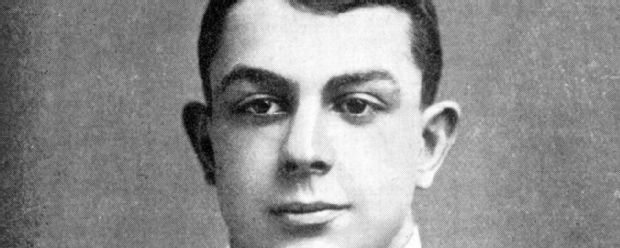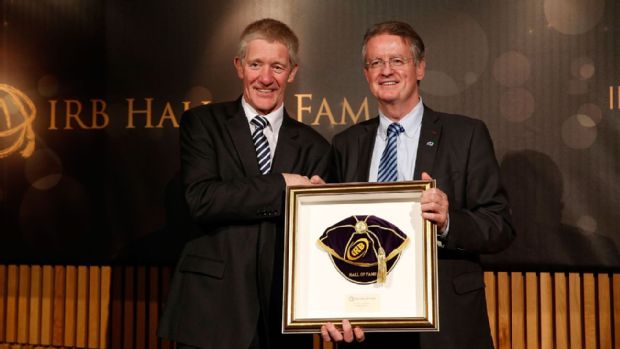|
Scotland
The hardest forward to play rugby: David 'Darkie' Bedell-Sivright
Huw Richards
September 5, 2015
 © PA Photos While the names of Ronald Poulton and Dave Gallaher ring loudest down the ages, they are not the only candidates as the greatest player to lose his life in World War One. Any such discussion should also include the Scottish forward David 'Darkie' Bedell-Sivright, who died at Dardanelles on September 5 1915. He was, reckoned veteran observer EHD Sewell, writing in 1944, "One of the best five forwards in the world in this century". Townsend Collins, a Welsh writer who was Sewell's near-contemporary and often his antithesis, rated Bedell-Sivright in 1948 as "one of the superlative forwards of the last fifty years". A more recent writer, Derek Douglas, chose him as "first among equals", the single player to receive a whole chapter to himself in his engagingly eclectic 1997 book of historical essays on the Scottish game, The Thistle. He played in three Triple Crown-winning teams (1901, 1903, 1907) - the only Scot to do so - the first of them reckoned by Sewell the best team he ever saw. He was member of the Scotland team which beat the first touring Springboks in 1906 and captained the Lions, admittedly in an era when having the resources to take several months off work was a prerequisite of selection. In an age before formal forward specialisation, he was a formidable all-rounder - in Douglas's words "A hard-tackling, ball-handling foot-rushing forward" - epitomising a time when the game offered nothing scarier than a rampant Scottish eight. Most of all, as Sewell wrote in 1919 in his commemoration of rugby's war dead, "Who was the hardest forward who ever played International football? Sivright would get most votes if the voting was confined to players, and probably so in any event." He was one of that long line of players, following on from predecessors like his compatriot William MacLagan and continuing through giants like Colin Meads and Martin Johnson, who have traded at the edge of the acceptable. His own explanation for his style of play was that "When I go on to that field I only see the ball, and wherever it goes I go too, and should someone be in the road, that is his own lookout."
Sewell, whose views on rugby physicality were neatly distilled in the title of the 1944 book in which he rated Bedell-Sivright among the greatest, "Rugger : The Man's Game", was unreservedly approving. Others were less enthused. Collins' admiration was tempered by the feeling that "He seemed to me to lack completely the chivalry which sets a crown on the great footballer." That view had its echoes in Scotland as well. The early chronicler RJ Phillips recalled of the only recorded occasion on which Bedell-Sivright came off second best, laid out in the Scotland-Ireland match of 1907 by another of the great war victims, Basil MacLear "I can still hear a comment in the Border tongue : 'that's been a long time coming till 'ee, mye mon, 'ee was never better served' ; cruel and unsympathetic, but the expression of a tolerably widely entertained opinion." That a man who was so obviously one of nature's warriors should have been serving as a medic rather than a soldier was an irony not lost on Bedell-Sivright, who wrote to a friend that "It makes me swear that I am a medico. I'd be ten times more useful with a parcel of jam-tin bombs and a few Turks in front of me, than as a sort of qualified vet." Taking on the formidable academic demands of qualifying in medicine surprised many of his friends from Fettes, a noted rugby nursery at the time, and Cambridge, where he won four blues between 1899 and 1902 as well as becoming a Scotland regular. But unlike many notable players in a time when rugby skill alone could be a sufficient to win an Oxbridge place - a decade later Cambridge's 'Jenny' Greenwood staggered team-mates on a train journey by reading a book relevant to his studies - Bedell-Sivright did not go to Trinity College solely to play rugby. Evidently one of these people who throw themselves wholeheartedly into the task of the moment, he was also a prodigious reader and built up a substantial library. There was one attempt to seek a different destiny, a year of stock-rearing in Australia which meant that he missed the 1905 championship, but that simply served to confirm him in the decision to seek a medical career. That spell as a stock-rearer came at the end of two consecutive Lions tours - to South Africa under the leadership of compatriot Mark Morrison in 1903 and Australia and New Zealand as captain a year later.  © (Photo by Tom Shaw/Getty Images for iRB) Lions tours at this time were unofficial, ad hoc events and teams were not fully representative. Neither was wholly happy for Bedell-Sivright. His time as captain was cut short by a broken leg at the beginning of the New Zealand section of the tour, with the on-field leadership passing to Welsh winger Teddy Morgan. He remained with the team, but did not make himself popular in New Zealand. Terry McLean's history of the All Blacks records that "From the start of his visit to New Zealand, Bedell-Sivright was patronizing in attitude. By word and manner, he conveyed disparagement of the Colonials." That the All Blacks won the only test 9-3 might have warned British rugby of the wrath to be visited upon it the following year. It has been suggested that one reason it remained complacent was Bedell-Sivright's reaction. McLean recorded that 'he tried to diminish it, declaring, in typically sour terms, that if New Zealand were to visit the Old Country, its players might succeed against underdog teams but would stand no chance of defeating the four national sides." His next international match, following his Australian sabbatical, would be against those same All Blacks in November 1905, leading the Scottish XV beaten 12-7 by them at Inverleith. By then he was studying at, and playing for, Edinburgh University. It is from this period of his life that the anecdotes of his celebrating a victory by lying on the tramlines in Princes St, Edinburgh for an hour - blocking the system since there was nobody strong or brave enough to remove him - then completing the evening by fly-tackling a cab horse, would appear to date. He also boxed, keeping the trainer at the gym where he worked out in constant fear that one of his visits might coincide with one from his brother James, capped once against Wales in 1902, with whom he did not get on. He had won the Amateur Heavyweight Boxing Championship of Scotland in 1904, but failed in an attempt to regain it in 1906. This was perhaps, Douglas records, because - unaware that his prospective opponent was a passenger in the same carriage - he had indulged in a ferocious bout of shadow-boxing on the train from Edinburgh to Glasgow. Forewarned of the frenzied assaults coming his way, the opponent kept his cool and his distance, picking him off with counter-punches and taking the title. But Bedell-Sivright persisted and regained the title in 1909. By then his international career was over, his 22nd and last cap coming in the defeat by Wales at Swansea in 1908. In 1914 he volunteered for the Navy as a surgeon and was sent to the Dardanelles in April 1915. His demise was not caused by bullet or bomb, but an insect bite which led to septicaemia and his death on September 5, 1915. Sewell wrote that he would be 'remembered and spoken of as long as the rugby game is played'. Certainly he has not been forgotten at Edinburgh University rugby club, which now endows scholarships named in honour of perhaps its greatest former player. Rest in Peace ? Hardly. Even at 100 years distance from his untimely death, it is clear that neither rest nor peace were likely when Bedell-Sivright was in the vicinity. © Huw Richards
|
Live Sports
Communication error please reload the page.
-
Football
-
Cricket
-
Rugby
-
- Days
- Hrs
- Mins
- Secs
F1 - Abu Dhabi GP
Abu Dhabi Grand Prix December 11-131. Max Verstappen ()
2. Valtteri Bottas (Mercedes)
3. Lewis Hamilton (Mercedes)
4. Alexander Albon ()
5. Lando Norris ()
6. Carlos Sainz Jr ()
-
ESPNOtherLive >>
Darts - Premier League
Golf - Houston Open
Snooker - China Open
Tennis - Miami Open

